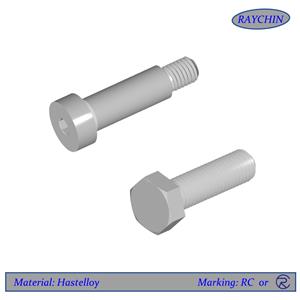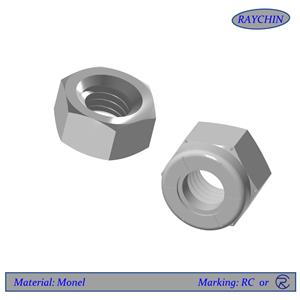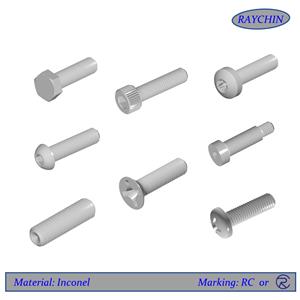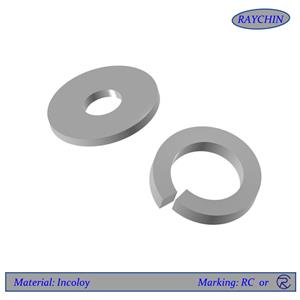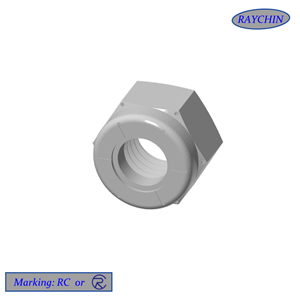-
Alloy 330 Lock Nuts
Alloy 330 lock nuts are specifically designed for high temperature furnace applications such as vacuum furnaces, heat treating and brazing applications. The most prized trait of alloy 330 is its ability perform under cyclic conditions of temperature extremes from heating and cooling; as well as in alternate carburizing and oxidizing atmospheres. An austenitic, nickel-chromium-iron-silicon alloy, 330 lock nuts also offer industry a low coefficient of expansion, excellent ductility, and high strength.
Send Email Details -
AL6XN Lock Nuts
Originally developed to combat sea water corrosion, AL6XN has expanded its role as being good mid-range corrosion resistant alloy. AL6XN lock nuts are a low carbon, high purity, nitrogen-bearing "super-austenitic" stainless alloy. Also considered a 6Moly alloy, AL6XN nuts are similar in chemistry and capabilities to Alloy 926 and SMO 254.With a higher nickel and molybdenum content than Duplex 2205 and Super Duplex 2507, it delivers better corrosion resistance while giving a more cost effective alternative to nickel super alloys like Inconel or Hastelloy in moderately corrosive conditions.
Send Email Details -
Nitronic Lock Nuts
Nitronic is a high strength austenitic steel alloy that was designed for high temperature use. It offers good high temperature properties as well as good low-temperature impact resistance. In addition, Nitronic bolts also offer nearly double the yield strength of 300 series stainless steel. Nitronic fasteners are available in two alloy variations, Nitronic 50 and Nitronic 60, each offering different niche capabilities.
Send Email Details -
Lock Nuts
Lock Nuts RAYCHIN is a manufacturer and worldwide supplier of standard & custom fasteners(Lock Nuts) including those manufactured from the following materials: Hastelloy® C-276, Hastelloy® C-22, Hastelloy® B-2, Hastelloy® G-30, Monel® 400, Monel® K-500, Inconel® 600, Inconel® 625, Inconel® 718, Incoloy® A-286, Titanium Grade 2, Titanium Grade 5, Titanium Grade 7, Nickel 200, Nickel 200, Aluminum, Molybdenum, Nimonic, Nitronic, Tantalum, Tungsten, Waspaloy, Zirconium, Duplex S31803, Duplex S32205 and Super Duplex S32750, etc.
Send Email Details -
Monel Lock Nuts
Monel® lock nuts, like Monel 400 and K500, are made from a nickel-copper alloy and exhibit high strength, toughness and good corrosion resistance over a wide temperature range. An outstanding characteristic of Monel lock nuts is that they offer exceptional resistance to hydrofluoric acid, a particularly tough acid to deal with, in all concentrations up to the boiling point. For hydrofluoric acid applications Monel nuts are perhaps the most resistant of all commonly used specialty alloys. Monel alloy 400 & K500 lock nuts also exhibit excellent corrosion resistance in marine applications and have reasonable corrosion resistance to sulfuric and hydrochloric acids under reducing conditions. Because of these characteristics, Monel nuts are often found in marine and chemical processing applications.
Send Email Details -
Tungsten Lock Nuts
Tungsten nuts are known for their extreme high density; because of this unique attribute, they are often used for balancing rotating parts. Tungsten’s high mass also makes these nuts radiopaque. This allows tungsten nuts to block radiation and show up well on x-rays – even better than lead. Another unique attribute of tungsten is its extrmely high melting point of 3420°C. The high temperature stability of tungsten nuts make them ideal for some of the hottest vacuum furnace environments. Beyond their high mass and temperature stability, tungsten nuts are also very corrosion resistant. Tungsten nuts are usually made from tungsten alloys per ASTM B777, and range from 90% to 97% pure tungsten, alloyed with nickel and copper or nickel and iron.
Send Email Details -
Tantalum Lock Nuts
Tantalum lock nuts are best known for its unmatched corrosion resistance and chemical inertness. Tantalum nuts have a similar corrosion resistance to that of glass, but all of the typical mechanical and electrical properties of a metal. Tantalum lock nuts are also extremely stable at high temperatures, since tantalum has a melting point around 3000°C. High temperature applications require vaccum or inert gas since tantalum may embrittle when used in oxygen rich environments above 250°C. Tantalum nuts are also one of the most bio-compatible metals available and is also radio-opaque due to its high density (16.68 g/cm3). All tantalum lock nuts are available in commercially pure tantalum and tantalum 2.5% tungsten (Ta-2.5%W).
Send Email Details -
MP35N Lock Nuts
MP35N lock nuts are known for their extraordinary strength and are the strongest nuts we offer at Extreme Bolt. MP35N nuts owe their extraordinary strength to a unique alloy combination of nickel, cobalt, chrome and molybdenum and have ultimate tensile strengths that range from 227 ksi to 294 ksi (with age hardening). Beyond the strength of MP35N lock nuts, they are also exhibit good corrosion resistance and can resist most mineral acids, hydrogen sulfide, seawater and salt spray environments. MP35N nuts are also resistant to high temperature oxidation and could operate in environments up to 800°F and still maintain much of its strength.
Send Email Details -
Molybdenum Lock Nuts
Molybdenum lock nuts possesses a very high melting point of 2620°C, a low coefficient of thermal expansion and a high level of thermal conductivity. Because molybdenum nuts have the ability to withstand extremely high temperatures without changing shape, expanding or softening significantly, they are ideal for high strength / high temperature applications that are shielded from oxygen. Exposing molybdenum fastener to oxygen above 600°C will cause them to readily oxidize. As a result, molybdenum lock nuts find their way into high temperature vacuum furnaces, glass production, military and space applications where oxygen is not present.
Send Email Details

